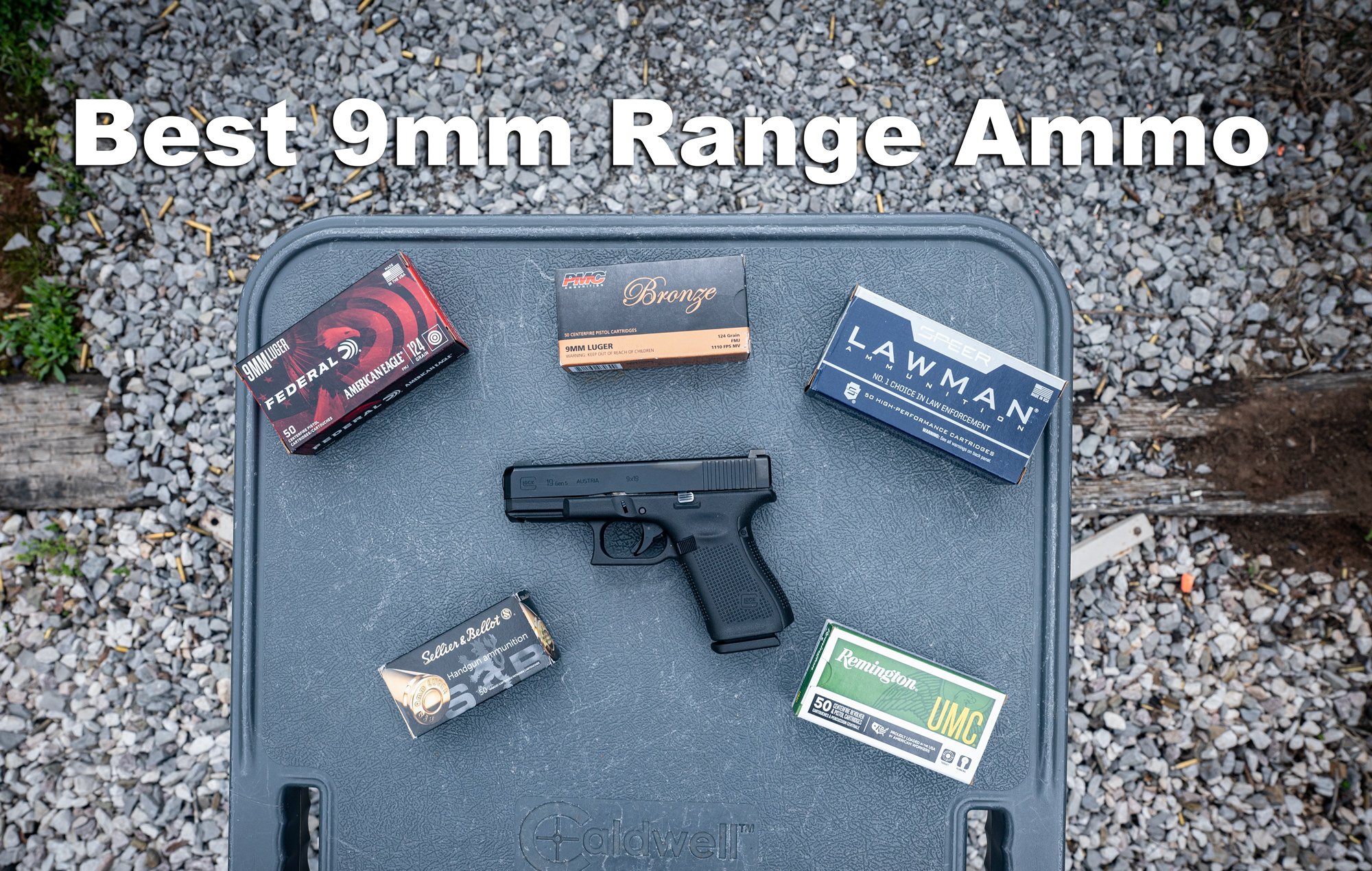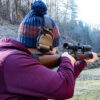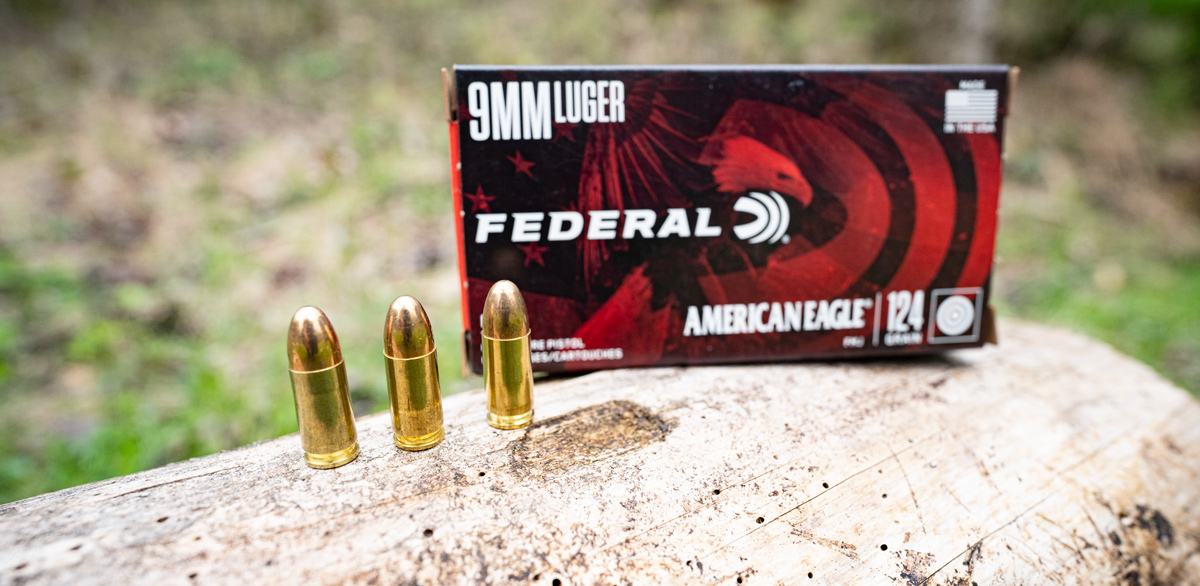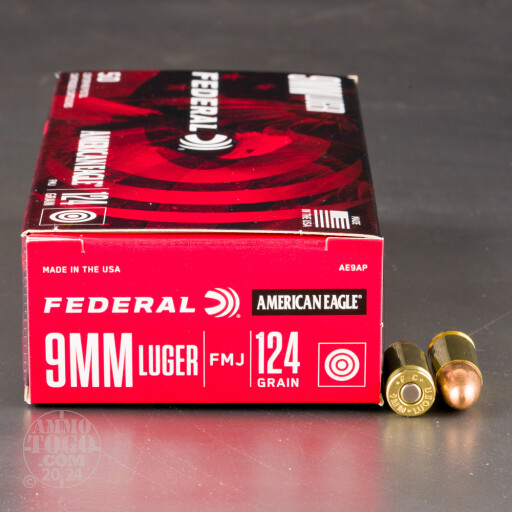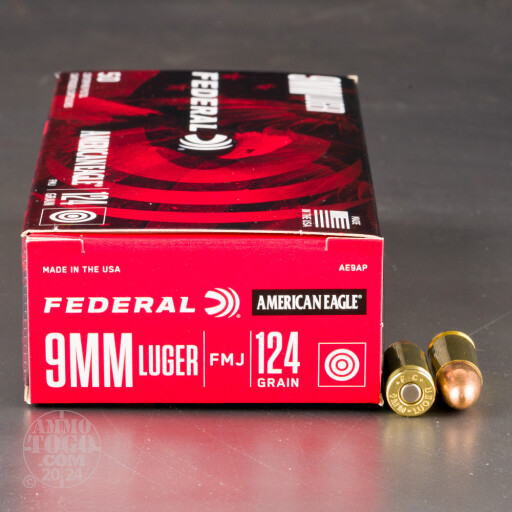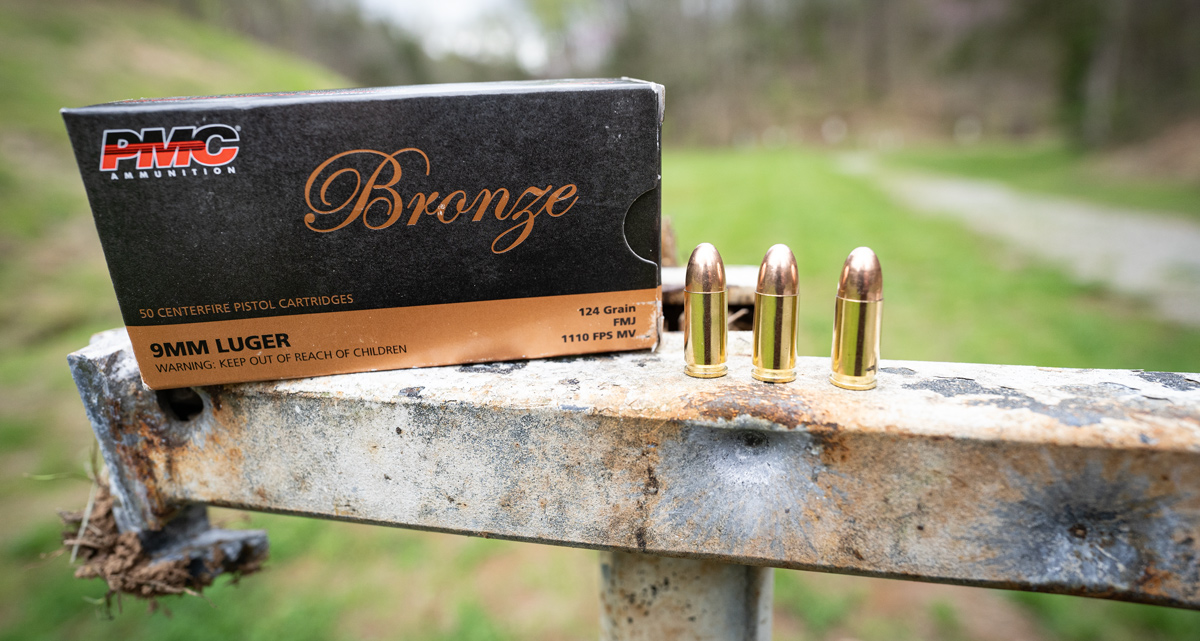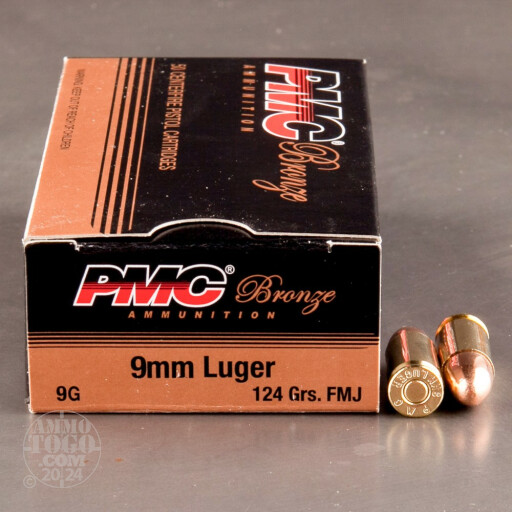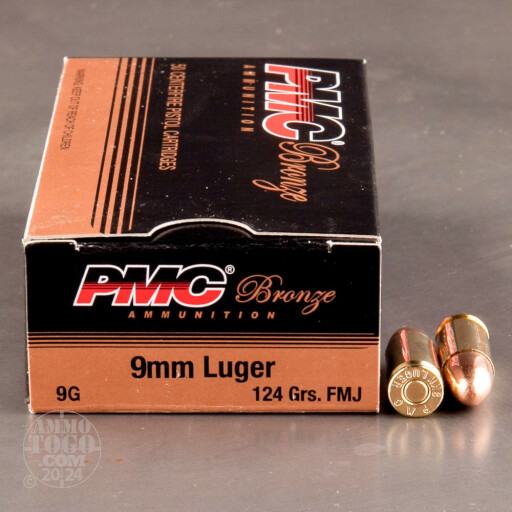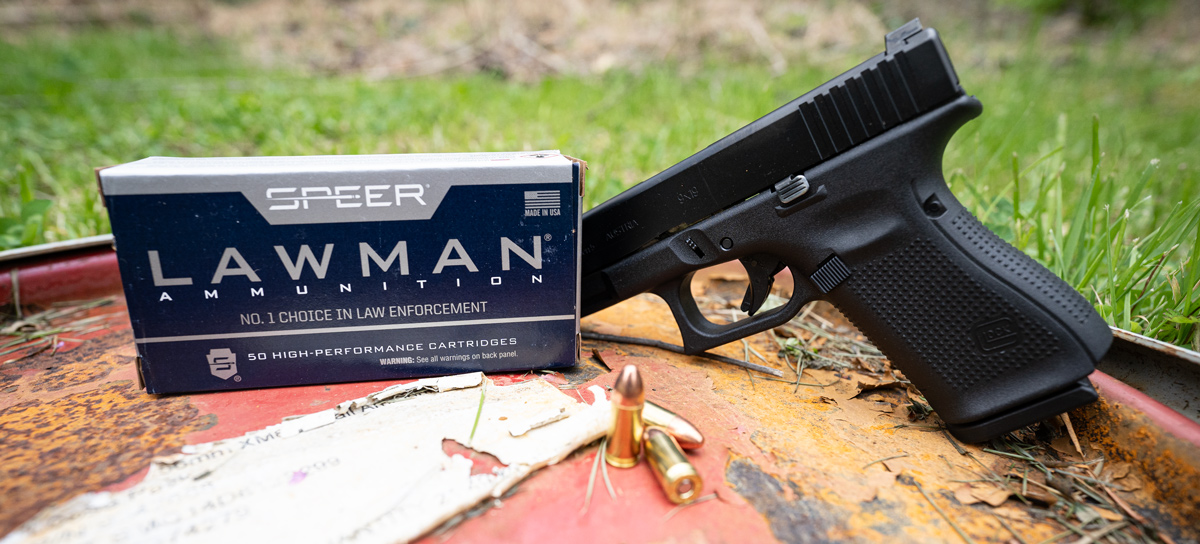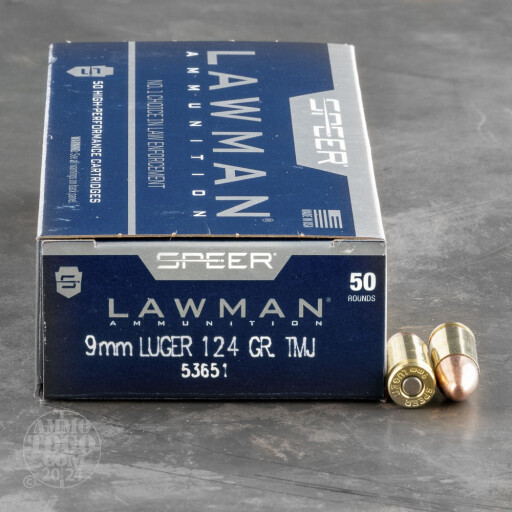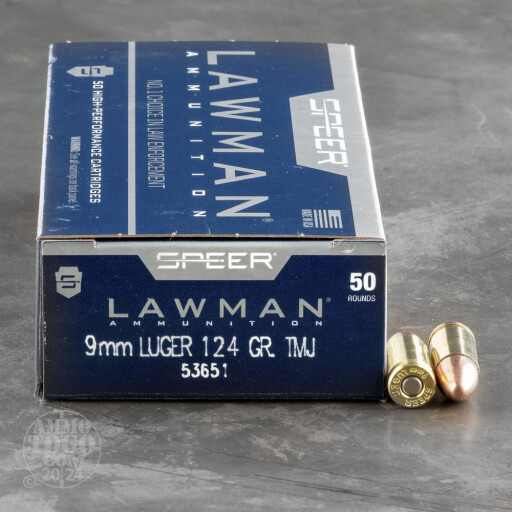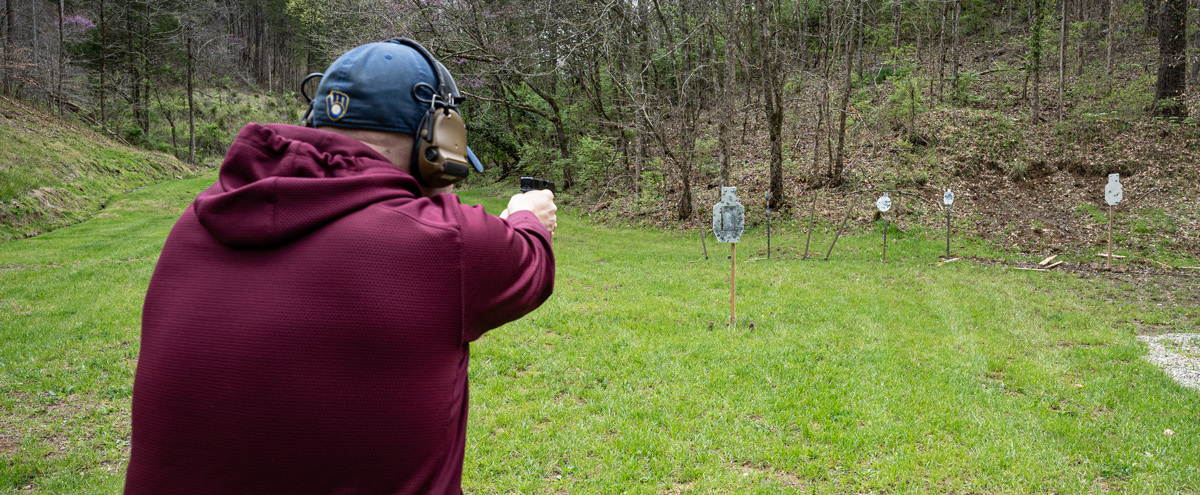We lay out our picks for the best options to use while training at the range with your 9mm pistol.
If you already have a favorite type of 9mm ammunition that you think is the best for range training, then that’s the best. Everything is subjective, and the customer is always right (except when they aren’t, but we don’t talk about that). We also might have omitted your favorite 9mm target ammo from our recommendations. If that’s the case, please teach us a lesson by leaving a comment. So, let’s dive into it – what are the best 9mm range ammo options out there?
The Best 9mm Ammo for Range Training
- Federal American Eagle 9mm 124 Grain FMJ
- PMC Bronze 9mm 124 Grain FMJ
- Speer Lawman 9mm 124 Grain TMJ
- Remington UMC 9mm 124 Grain FMJ
- Magtech 9mm 124 Grain FMJ
We only going to recommended 124 grain loads for 9mm range training– not necessarily because we think that’s the best bullet weight for target practice, but because it’s the 9mm’s middleweight bullet that offers the most balanced performance. We don’t fault anyone who opts for a lighter 115-grain or heavier 147 grain 9mm load for training. In fact, we encourage you to pair your practice ammo to your self-defense loads.
Federal American Eagle 9mm – 124 Grain – FMJ
Pretty much the gold standard as far as everyday range ammo goes: made in Minnesota, loaded with economical yet consistent FMJ projectiles, clean-shooting and reloadable. Like any good 9mm training ammo, American Eagle exhibits recoil and point of aim that are both virtually identical to those of analogous self-defense loads.
PMC Bronze 9mm – 124 Grain – FMJ
Made in South Korea by a company that’s trusted to produce rounds for our NATO allies in the South Pacific. PMC produces ammo in an ISO-9001 certified facility. That means you get consistent quality round after round. These particular 9mm training rounds feature a quality full metal jacket projectile and brass casings. We tested a ton of their ammo in our PMC ammo review where it performed very well.
Speer Lawman 9mm – 124 Grain – TMJ
Reliable, consistent, and made in Idaho: three big boons in our book. Lawman series ammo is loaded to approximate the performance of Speer’s outstanding Gold Dot series self-defense ammo, which makes it highly instructional if that’s also your choice for personal protection. TMJ bullets that conserve accuracy and minimize the shooter’s exposure to lead gas are also a big plus!
Remington UMC 9mm – 124 Grain – FMJ
Made in Arkansas and perfect for any make or model of handgun or pistol caliber carbine you could name. “UMC” is just a brand name that stands for “Union Metallic Cartridge Company” – a company Remington merged with many moons ago.
Magtech 9mm – 124 Gr – FMJ
One of the better choices if you want to save as much money as possible. These loads are consistently cited by shooters as some of the best bang for the buck you’ll find in 9mm ammo. Magtech is made in Brazil will brass casings. (In 2023/2024 Magtech delivered a steel-cased version of their popular 9mm ammo. In early trials, we’ve enjoyed reliable feeding and performance with their steel-cased loads as well. They typically slide in $10-$15 cheaper per case than the brass-cased counterpart.)
So, why did we recommend those loads for the range? Well, personal experience plays a role. We’ve found them all to be quite reliable. But there are broad characteristics they share that you can look for.
Traits of Good 9mm Range Ammo
Reputable Manufacturer
We’ve got nothing against smaller foreign ammo companies. God bless them for making our favorite thing in the world: ammo. That said, the highest-quality ammo tends to originate in the best country in the world: America. Brands like Federal Premium, Remington, Winchester, Hornady, CCI and Speer have earned their reputations as industry leaders for good reason.
Foreign companies like Prvi Partizan (Serbia), Igman (Bosnia & Herzegovina), Sellier & Bellot (Czech Republic), and Aguila (Mexico) are also really good. If you’re looking for cheaper steel-cased plinking ammo, then check out Wolf, Barnaul and Tula — though supplies of these may be limited due to Russian sanctions. Their products aren’t as dependable as American brass-cased materiel, but those Russian companies are the biggest steel-cased ammo makers and typically deliver what they promise: cheap and serviceable ammo.
Non-Expanding Bullet
Some people advise exclusively training with the same ammo you’d rely on for self-defense. Their argument is that you want to fully familiarize yourself with your carry ammo’s performance before you would stake your life on it. It’s a sound theory, but it overlooks something very important: cost. You should use high-quality jacketed hollow point (JHP) ammo for personal protection (or a suitable alternative like Black Hills’ HoneyBadger ammo). Unfortunately, shooting large quantities of premium self-defense ammo is an unsavory prospect when you have a limited supply of moolah.
Here are the 9mm bullets you ought to favor for target shooting:
- Full metal jacket (FMJ) – Lead core, gilding metal jacket that promotes smooth feeding and reduces barrel fouling, and nothing else. The most popular bullet for target shooting. (Also known as a “metal case.”)
- Total metal jacket (TMJ) – Just like an FMJ, but with a gilding metal jacket that fully encapsulates the lead core instead of leaving it exposed at the base. Prevents lead aerosolization during ignition, which keeps the bore cleaner and reduces the shooter’s exposure to toxic gas.
- Frangible – Designed to burst apart into dust and fragments on impact. Significantly reduces the risk of splash-back or a ricochet that could jeopardize shooters standing at the firing line. Mostly favored for shooting steel targets at close range.
- Bi-metal jacket – This is actually an FMJ, but with a jacket that is mostly made of steel instead of gilding metal (the latter of which predominantly contains semi-precious copper). Steel makes the bullet cheaper, but also capable of attracting a magnet and therefore unwelcome at many commercial ranges.
Noncorrosive Primers
A lot of newer shooters are concerned about corrosive primers, which will destroy a firearm with rust if it is not subjected to extra steps during cleaning (i.e. cleaned with boiling water, hot soapy water, Windex or Ballistol). You don’t have to be overly concerned about corrosive primers, however. Unless it’s pre-1950s American military surplus or Soviet-era Russian military surplus, your ammo is nearly certain not to have the old-fashioned hygroscopic primers that cause rust.
Casings for Good 9mm Training Ammo
Make sure the ammo you buy is loaded. More than a couple of our customers have ordered component bullets intended for handloaders, which are completely useless to them because they do not already own reloading presses. If the ammo in the picture doesn’t have cases, then it’s just bullets. That’s probably not what you’re looking for.
You generally have three options when it comes to your training ammo’s cases:
- Brass – The cleanest-shooting and most reliable type of case, albeit the most expensive. Reloadable.
- Aluminum – The second cheapest type of case, exclusively available from Blazer and Federal. Highly reliable, but permits relatively more fouling to enter the action. Not reloadable.
- Steel – The cheapest type of case. The least reliable, which isn’t to say it will not work, and also accompanied by the most fouling. Not reloadable (unless you have the patience of a saint, hard-to-find component Berdan primers, and possibly a few screws loose).
Any 9mm Options You Should Avoid?
The loudest caution we would offer is going big before testing ammo with unknown suppliers. As ammo prices have increased, we’ve seen more foreign ammo producers jump in to try to feed the American civilian market with rounds. Often, these ammo makers deliver great value. Sometimes, their product is trash though. Before you go deep into one manufacturer’s product, grab a box or two and make sure it cycles in your pistols smoothly. (This is true of all calibers, in our experience.)
In all honesty, if you’re new to the great wide world of guns, you’re probably going to approve of most of the 9mm training ammunition you find on the market. Experiment to discover which one you like best! And try not to order a whole case of anything before you’ve sorted out your personal preferences. DYOR: do your own research!
